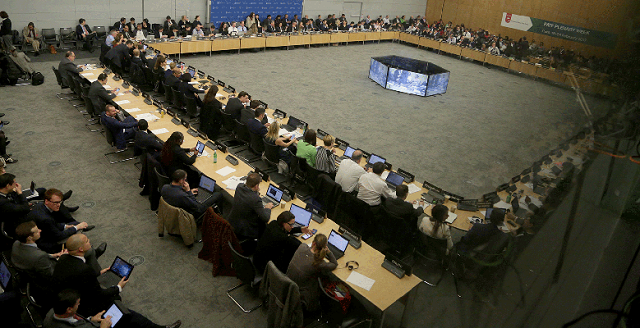Customs law changes on cards to meet FATF rules
Amendments to customs act to meet FATF requirement

PHOTO: FATF
It has proposed amendments in Clause 42 of the Customs Act of 1969 that deals with the arrival of conveyance.
The amendments are part of the Finance Bill 2018, which were also backed by the Senate Standing Committee on Finance on Thursday.
“The new amendments are aimed at meeting the Financial Action Task Force requirements regarding the Action Plan to come out of its grey list,” said Zahid Khokar, FBR (Member) Customs, while explaining the rationale of the amendment to the standing committee.
FATF expresses concern over PM’s tax amnesty scheme
He said, “This will help address the money laundering issue, particularly where people are involved in movement of cash.”
With effect from June, the FATF has placed Pakistan in a list of countries that promote money laundering and terrorism financing. The country is committed to come out of the grey list.
Earlier, the FBR was only seeking information of the crew. Now the new amendment states that it will be binding on everyone to provide the list of crew and the passengers.
According to another proposed amendment, the conveyance will be bound to provide information record.
Zahid Khokar explained that the amendment will help trace the payment mode of tickets of the passengers, which will help trace the trail of money-launderers.
The committee endorsed another proposal to increase the Pakistan Customs Waters jurisdiction from 12 nautical miles to 24 nautical miles from the appropriate base line on the coast of Pakistan.
Revenue for govt: FBR collects Rs2.922tr in July-April, up 16%
Minister’s powers
In a departure from its earlier policy, which was in conflict with a Supreme Court judgment, the government has proposed to withdraw the powers of finance minister to impose or exempt taxes and duties. The standing committee backed the government’s proposal.
Now the powers will go back where they belong, which is the federal cabinet.
In its historical August 2016 judgment, the Supreme Court had defined the federal government as the federal cabinet and the prime minister.
However, in order to circumvent the apex court judgment, former finance minister Ishaq Dar introduced amendments in four tax laws to regain the powers in June last year.
In February, the Sindh High Court struck down those clauses that empowered the finance minister to make changes to tax laws. This created serious problems for the FBR that had imposed heavy regulatory duties by exercising the powers.
In another related amendment, the government has also proposed to withdraw those powers that allow the FBR to issue notifications with the approval of the federal finance minister pursuant to the approval of the Economic Coordination Committee of the cabinet.
According to the amendment, now the FBR can issue a notification only after the approval of the federal government, which means the cabinet.
WTO arrangement
The Senate standing committee objected to the FBR’s decision to bring certain amendments to the law without properly assessing its impact just to meet the requirements of the World Trade Organisation.
The FBR wanted to insert a new clause in the law to introduce the concept of “Authorised Economic Operator Programme”.
Under the 2014 Facilitation Trade Agreement, the WTO wanted hassle-free goods clearance and duties payments mechanisms for big multinational companies.
PAC summons FBR chief for failing to scrap lower duty slab
However, the FBR did not have the idea about the nature of those MNCs and inserted the clause in the Finance Bill 2018 just to fulfill the WTO requirement.
The standing committee also objected to a new mechanism proposed for making the Alternate Dispute Resolution for swift resolution of tax disputes.
The committee recommended the government to improve the existing arrangement instead of bringing an altogether a new concept.



















COMMENTS
Comments are moderated and generally will be posted if they are on-topic and not abusive.
For more information, please see our Comments FAQ